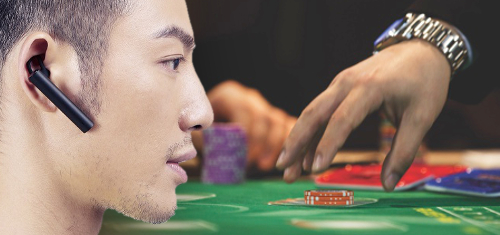 Macau’s ban on the use of mobile phones in casinos is less than a month old and technological workarounds are already in play.
Macau’s ban on the use of mobile phones in casinos is less than a month old and technological workarounds are already in play.
On May 9, Macau casinos began enforcing the ban on the use of phones at gaming tables, a step widely perceived as a way to stamp out so-called ‘proxy’ betting, in which the person seated at the table relays real-time card info to the real gambler on the Chinese mainland.
On Wednesday, Bloomberg reported that at least three junket operators claimed to be still conducting proxy betting by equipping the proxy with an earpiece wirelessly connected to his mobile phone. The junkets said the proxies sometimes used their hair to help conceal the earpieces.
Other junkets are reportedly using two-man teams, with the proxy at the table keeping up a loud commentary on the table action, while his accomplice (with an open line to the actual gambler) sits within earshot.
The junkets claimed to work out of independent VIP rooms at casinos operated by SJM Holdings and Melco Crown Entertainment. Melco issued a statement saying it was fully complying with the new regulations, while SJM exec director Angela Leong has previously stated that her company had increased monitoring to ensure compliance.
Singapore implemented its own proxy betting ban at the city-state’s two integrated resorts last year, which included fines of up to S$5k for individual gamblers and up to S$200k and five years in prison for anyone caught facilitating the practice.
But Macau neglected to couple its phone ban with specific punishments for transgressors – be they players or operators – which may have encouraged junkets to deem the risk worth running.
Perhaps belatedly recognizing this disconnect, Macau’s Gaming Inspection and Coordination Bureau (DICJ) issued a statement saying it would take “severe measures” against anyone caught violating the ban.
A week after the ban took effect, DICJ head Paulo Martins Chan said the regulator was still working out the enforcement details, suggesting that undercover ‘sting’ operations may be required to root out offenders if voluntary compliance proved inefficient. Sanford C. Bernstein analysts reported that the DICJ intends to hire 50 additional gaming inspectors to bolster its existing 120-strong team.
It’s anybody’s guess as to how much of Macau’s dwindling gaming revenue was generated via proxy betting prior to the ban. Daiwa Capital Markets estimated the total at $2.6b in 2015, a 15% year-on-year gain, reflecting the desire of Chinese VIPs to avoid being seen traveling to Macau. Other analysts have suggested proxy betting accounted for between 5% to 10% of Macau’s total VIP turnover.
